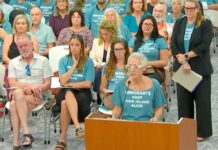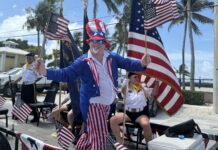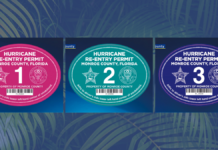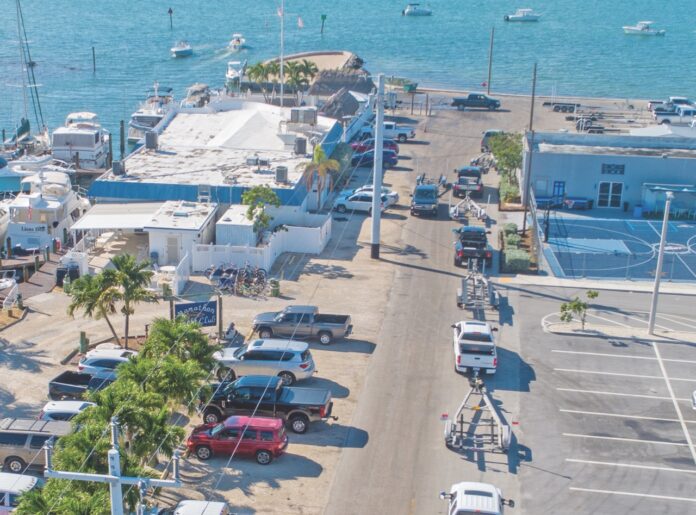The Marathon City Council’s Feb. 28 workshop began with a discussion of redesigning the city’s 33rd Street corridor, but two more immediately impactful items for Marathon residents and visitors filled its final minutes, as talks resurfaced of beach and boat ramp parking as well as potential building permit refunds.
Heather Carruthers and Dane Suchoza of K2M Design Inc. opened the evening with a presentation on 33rd Street, long acknowledged as an overcrowded corridor in need of a refresh as it attempts to accommodate multiple high-usage elements in close quarters on parcels owned by the city of Marathon, Monroe County, the Monroe County School Board and the Florida Keys Aqueduct Authority.
Tasked with coming up with a plan for a redesign of the street while accommodating a three-bay fire station, the Monroe County Senior Center, the Marathon Yacht Club, the Marathon Rec Center, Stanley Switlik Elementary School and the public boat ramp at the end of the street, which experiences frequent boat trailer parking concerns, Carruthers and Suchoza urged the idea of an overarching master plan that extended beyond the current corridor to nearby assets like the hospital, library and community park.
“We’re talking about a master plan, but I think we need to focus on the prize, which is 33rd Street and what we can do,” said Mayor Luis Gonzalez. “Everybody around us has upgraded, and our part of 33rd Street looks terrible. So we need to do something now, and incorporate that into the master plan.”
While no formal vote was taken, City Manager George Garrett said he will move forward with preliminary conversations with state and local stakeholders for potential property acquisitions around the corridor that would allow the reshuffling of vital resident services. One such suggestion by councilman Kenny Matlock included acquiring the current Florida Highway Patrol building on U.S. 1 in front of Switlik and moving the Marathon Rec Center into the space.
Beach parking and boat ramps
The city’s announcement late last week of upcoming non-resident parking and boat ramp usage fees at Sombrero Beach and the city’s public ramps was met with an angry outcry from residents and visitors on social media, many of whom said they were unaware of the impending change until they saw the meters being installed and the city’s subsequent Facebook post. Some asked for inclusion of Duck Key and Big Pine Key residents in the fee exemption.
With the new fees, non-residents will pay $25 to launch and $25 to retrieve boats at public ramps as well as $20 per day to park. Sombrero Beach parking will be $5 per hour for the first two hours, plus $2 for each additional hour.
Public works director Carlos Solis confirmed that with the system’s license plate recognition technology, full-time residents and property owners with vehicles registered within the legal confines of the cities of Marathon or Key Colony Beach will be automatically excluded from the parking and boat ramp fees without any further action on the part of the vehicle owner.
Full-time Marathon and KCB residents with vehicles registered in other areas will be required to use a system available soon on the city’s website – promised by Friday, March 3, according to Solis – to verify their residency and request an exemption for their vehicle(s)’ license plates. Big Pine Key and Duck Key residents are required to pay for parking.
In an effort to diffuse boat ramp congestion and drive funds to local businesses once the city ramps are no longer free for visitors, councilman Kenny Matlock suggested the city post a list of local marinas that offer public use of their ramps for a fee.
Retroactive permit fee refunds still an ethical question
In a continuation of the council’s discussion of retroactive fee reductions for Marathon residents who overpaid on building permit fees since December 2020, City Attorney Steve Williams asked council members whether they wished to pursue a written opinion from the Florida Ethics Commission on each member’s ability to vote on such a decision, as four of the five council members would receive money with retroactive refunds.
Williams said individual council members who would receive a “disproportionately high” refund – defined in relation to the average amount paid back to each Marathon resident who filed permits since December 2020 – would be precluded from voting due to ethical concerns.
Records provided to the Weekly list the average fee refund per resident who pulled permits as roughly $2,000. Councilman Jeff Smith would receive the largest refund with a retroactive reduction at $8,711.45 in fees paid since December 2020, while councilman Lynn Landry would receive $5,205.92, Matlock would receive $3,126.80 and councilwoman Robyn Still would receive $2,170.16. Gonzalez would not receive a refund.
With the ethics commission unwilling to provide an informal oral opinion, Williams said the turnaround time for the written opinion would be at least two or three months. The written opinion will include whether a voluntary election by council to waive their personal refunds or donate them to charity would change their voting eligibility, as well as if Garrett could act to issue the retroactive refund without a vote by council if the council cannot field an ethically qualified quorum.
The council elected to pursue a formal written opinion clearly outlining the city’s ethical options and parameters for issuing the refunds.























